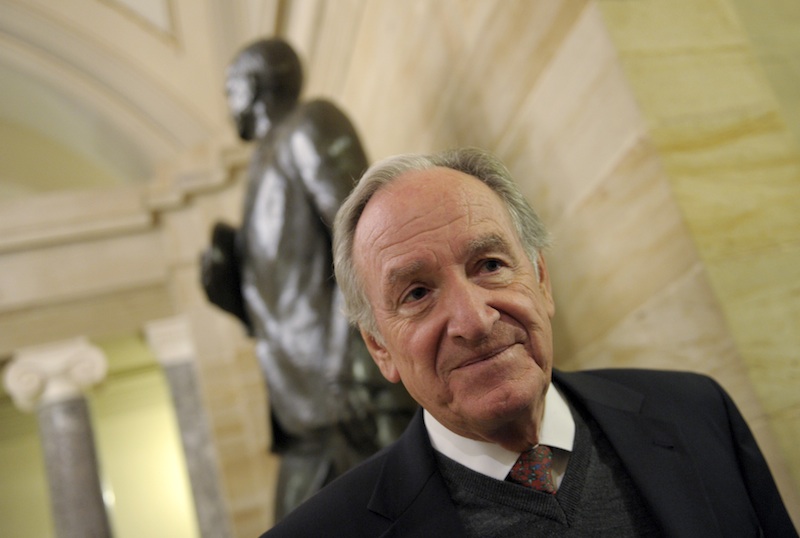In a town consumed by how quickly and how deeply to cut Social Security, a handful of Democratic senators have a different idea: expand it.
Their pitch is to grow Social Security benefits by attaching it to a new formula, known as CPI-E (Consumer Price Index for the Elderly), which is based on the theory that seniors face higher-than-average price increases, such as on health care and housing. It would be paid for by phasing out the cap on wages subject to the payroll tax, which is currently $113,700. Supporters say this would raise Social Security compensation for all beneficiaries by $70 per month.
Legislation to this effect was introduced earlier this spring by Sen. Tom Harkin (D-IA), the chairman of the Senate Health, Education, Labor & Pensions Committee. The Strengthening Social Security Act of 2013 has since been co-sponsored by Sens. Brian Schatz (D-HI), Mark Begich (D-AK) and Sherrod Brown (D-OH), who added his name this week.
Progressive activists are touting the bill, eager to shift the terms of the debate from how much to cut retirement benefits to ways to increase them. The AFL-CIO, the nation’s largest labor union, wants to expand Social Security. Liberal activist groups including MoveOn.org and the Progressive Change Campaign Committee have made it their new rallying cry.
“Senator Brown’s endorsement of expanding Social Security benefits is a clear sign that Democrats are ready to go on offense after winning the government shutdown, after years of playing defense,” said PCCC’s co-founder Adam Green. “[O]ur polling shows that expanding benefits is super popular even in deep red states like Texas and Kentucky. Progressives are on offense, and we’re not looking back.”
The idea of expanding Social Security isn’t going anywhere in Congress, at least anytime soon. The White House and Democratic leaders have not backed it. And if they did, it would run into a brick wall of Republican opposition in budget negotiations.
Instead, President Barack Obama has publicly endorsed a cut to future Social Security benefits by attaching them to a lower rate of inflation, known as Chained CPI. Republicans strongly support this change. (Under Chained CPI, benefits would grow more slowly, based on the theory that rising prices lead to changes in behavior. For instance, if the price of chicken rises, seniors can maintain their standard of living by buying less chicken and more beef.)
“There’s been talk of tying Social Security benefits to a ‘Chained CPI.’ But really, that’s a fancy Washington way of saying ‘let’s cut into people’s benefits over time,'” Brown said upon signing a PCCC petition for Harkin’s bill. “We need to expand Social Security, not cut benefits.”
The politics of Social Security are odd. Liberals cherish the program as a crowning example of a successful, popular government program; but Obama, under pressure from conservatives, has championed a budget that shrinks it. Conservatives see the program as an example of the nanny state gone wild, and want to cut, privatize and dismantle it. But for years GOP leaders have refrained from signing their names on a proposal that cuts Social Security. True believers like House Budget Chair Paul Ryan (R-WI) want to privatize the program, but even he conspicuously kept that proposal out of his budget blueprint for the third year in a row this spring.
“Medicare and Social Security are going broke,” Ryan said last week. “The Congressional Budget Office says if we don’t act, we’ll have a debt crisis. … We can’t kick the can down the road anymore. We’ve got to get a handle on our debt — now.”
Republicans are eager to cut Social Security, but they want Democrats’ fingerprints on the knife, so they don’t take the blame. The GOP base includes disproportionately older Americans who love Social Security — a fact they were reminded of when they tried and failed to privatize it in 2005. For now, Democrats still largely accept the conservative framing on Social Security and the public sees little, if any, daylight between the two parties. If they change course and force votes on proposals to expand Social Security, it could put Republicans on the spot and clarify who really supports the program and who doesn’t.
“The American Dream promises that if you work hard and play by the rules you’ll be able to save for retirement and enjoy your golden years with your grandchildren,” said Harkin. “We must ensure that, after a lifetime of hard work, Americans are able to retire with dignity and financial independence. This legislation helps to achieve that goal.”






